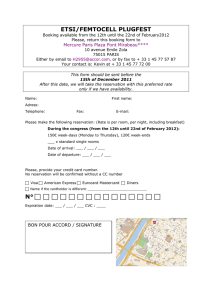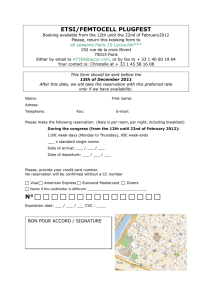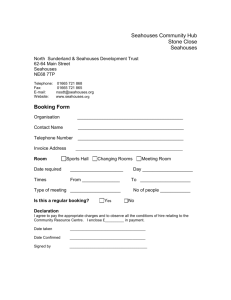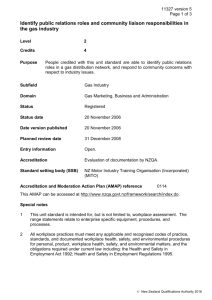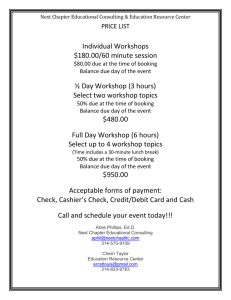Use a travel management system to manage client files and... travel arrangements for clients
advertisement
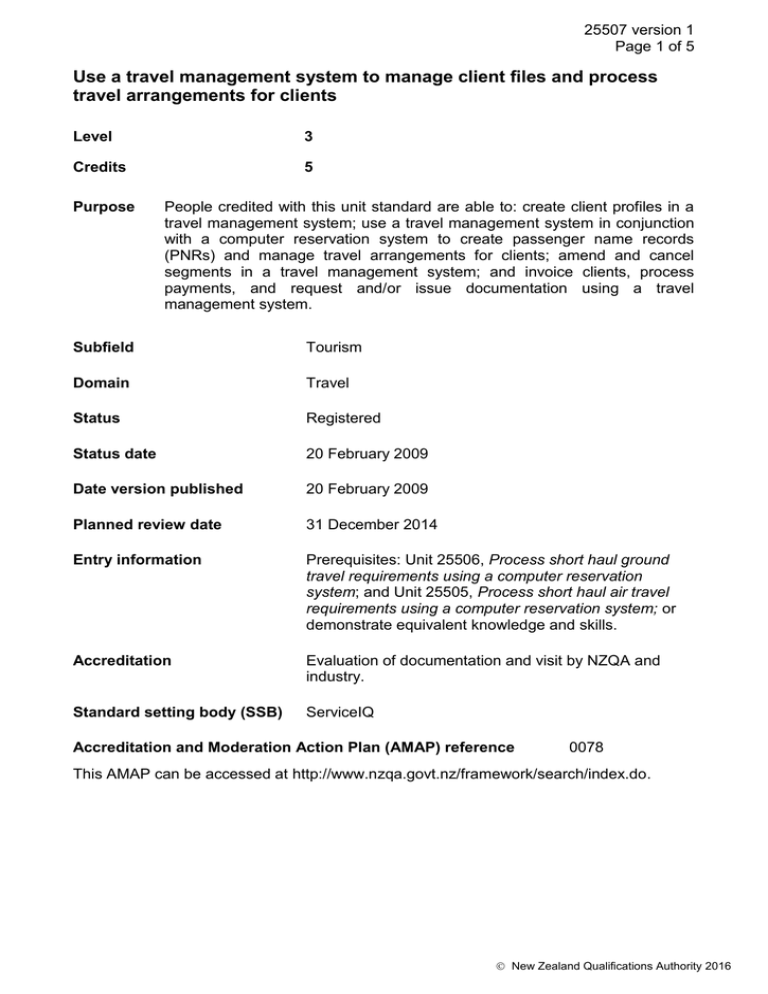
25507 version 1 Page 1 of 5 Use a travel management system to manage client files and process travel arrangements for clients Level 3 Credits 5 Purpose People credited with this unit standard are able to: create client profiles in a travel management system; use a travel management system in conjunction with a computer reservation system to create passenger name records (PNRs) and manage travel arrangements for clients; amend and cancel segments in a travel management system; and invoice clients, process payments, and request and/or issue documentation using a travel management system. Subfield Tourism Domain Travel Status Registered Status date 20 February 2009 Date version published 20 February 2009 Planned review date 31 December 2014 Entry information Prerequisites: Unit 25506, Process short haul ground travel requirements using a computer reservation system; and Unit 25505, Process short haul air travel requirements using a computer reservation system; or demonstrate equivalent knowledge and skills. Accreditation Evaluation of documentation and visit by NZQA and industry. Standard setting body (SSB) ServiceIQ Accreditation and Moderation Action Plan (AMAP) reference 0078 This AMAP can be accessed at http://www.nzqa.govt.nz/framework/search/index.do. New Zealand Qualifications Authority 2016 25507 version 1 Page 2 of 5 Special notes 1 Definitions Travel management system refers to any computer system used in the travel industry capable of managing client, booking, and financial details, and interfacing with a computer reservation system. Examples of travel management systems may include but are not limited to – Sabre Agency Manager (SAM), CrossCheck Travel (CCT), Tramada. Computer reservation system refers to any computer system used in the travel industry to make reservations. For example – a global distribution system (GDS), an airline website, a wholesale travel system (Calypso). Travel industry workplace policies and procedures refer to documented instructions about workplace expectations, these must include but are not limited to – customer service delivery, personal presentation, legislation, organisational structure, business objectives. Client profiles for the purpose of this unit standard are for recording information that directly relates to a customer, which assists the travel agent when making travel arrangements for that customer. Mandatory fields refer to those fields within the travel management system which must be completed as specified by the supplier of the travel management system and/or travel industry workplace policies and procedures. Client booking profiles for the purpose of this unit standard are for recording travel and non-travel information (including financial transactions) relating to a customer’s travel arrangements. Costings refer to the financial information for each segment within a client booking profile and may include but is not limited to – gross and net amounts, taxes, GST, commission. Suppliers, in the context of this unit standard, may include wholesalers and/or direct suppliers. 2 Competency in this unit standard must be demonstrated using a travel management system in conjunction with a computer reservation system. A theoretical knowledge of the travel management system is not sufficient to gain competency. 3 Legislation relevant to this unit standard includes but is not limited to – Privacy Act 1993 and any subsequent amendments. New Zealand Qualifications Authority 2016 25507 version 1 Page 3 of 5 Elements and performance criteria Element 1 Create client profiles in a travel management system. Range three client profiles. Performance criteria 1.1 Client profiles are created in a travel management system in accordance with travel industry workplace policies and procedures. Range information may include but is not limited to – name, date of birth, personal contact details, company, company contact details, passport and/or visa details, special requests, airline/hotel/rental car preferences, frequent traveller and/or loyalty programme memberships; evidence relating to all mandatory fields is required. Element 2 Use a travel management system in conjunction with a computer reservation system to create passenger name records (PNRs) and manage travel arrangements for clients. Range evidence is required for three different bookings; at least one booking must include an adult, child and/or infant. Performance criteria 2.1 Client information from the travel management system is uploaded to the computer reservation system to create the PNR. 2.2 PNR is downloaded from the computer reservation system to the client booking profile in the travel management system. 2.3 Travel and/or non-travel segments related to client travel arrangements are manually loaded into the client booking profile in the travel management system. Range may include but is not limited to – flights, accommodation, travel insurance, foreign exchange, departure tax, service fees, amendment fees; evidence is required for two different segments. 2.4 Costings are loaded, checked and/or amended in the client booking profile in accordance with travel industry workplace policies and procedures. 2.5 Profit margin in the client booking profile is checked and any amendments made are in accordance with travel industry workplace policies and procedures. New Zealand Qualifications Authority 2016 25507 version 1 Page 4 of 5 Element 3 Amend and cancel segments in a travel management system. Performance criteria 3.1 Travel and/or non-travel segments in the client booking profile are amended in accordance with client requirements. Range 3.2 Costings in the client booking profile are amended in accordance with travel industry workplace policies and procedures. Range 3.3 evidence is required for two different amendments. evidence is required for two different amendments. Travel and/or non-travel segments in the client booking profile are cancelled in accordance with client requirements. Element 4 Invoice clients, process payments, and request and/or issue documentation using a travel management system. Performance criteria 4.1 Confirmation itinerary and invoice are prepared for the client in accordance with travel industry workplace policies and procedures. 4.2 Client payments and/or supplier payments are processed in accordance with travel industry workplace policies and procedures. 4.3 Documentation is requested and/or issued in accordance with supplier requirements and travel industry workplace policies and procedures. Please note Providers must be accredited by NZQA, or an inter-institutional body with delegated authority for quality assurance, before they can report credits from assessment against unit standards or deliver courses of study leading to that assessment. Industry Training Organisations must be accredited by NZQA before they can register credits from assessment against unit standards. Accredited providers and Industry Training Organisations assessing against unit standards must engage with the moderation system that applies to those standards. New Zealand Qualifications Authority 2016 25507 version 1 Page 5 of 5 Accreditation requirements and an outline of the moderation system that applies to this standard are outlined in the Accreditation and Moderation Action Plan (AMAP). The AMAP also includes useful information about special requirements for organisations wishing to develop education and training programmes, such as minimum qualifications for tutors and assessors, and special resource requirements. Comments on this unit standard Please contact the ServiceIQ qualifications@serviceiq.org.nz if you wish to suggest changes to the content of this unit standard. New Zealand Qualifications Authority 2016
